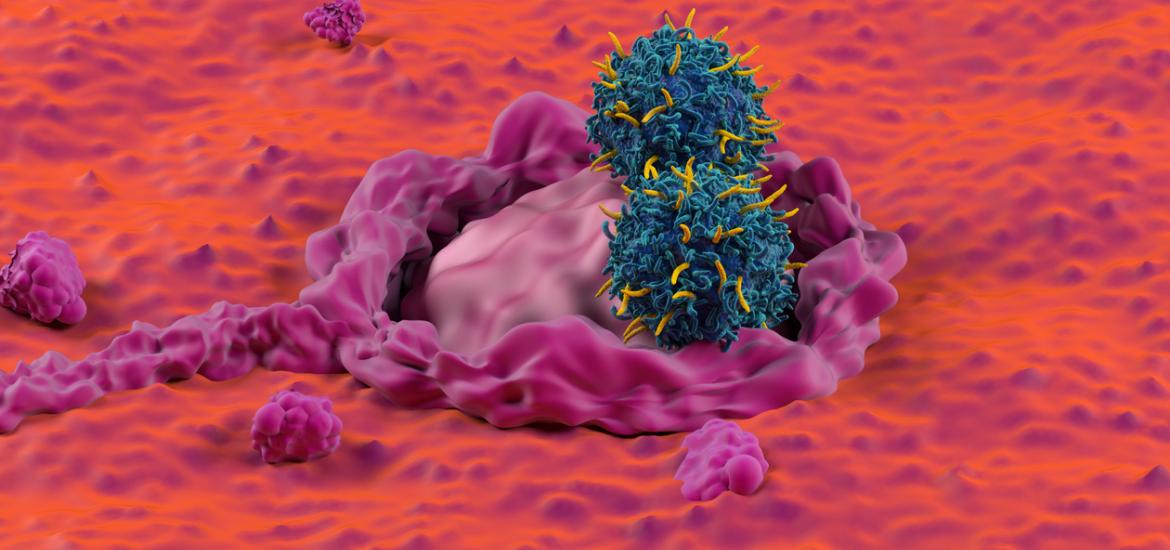
Colorectal cancer is next for VEGF bispecifics
Pumitamig is the latest to be tested in first-line disease.
Pumitamig is the latest to be tested in first-line disease.

Colorectal cancer seems to be a new departure for anti-PD-(L)1 x VEGF bispecifics, and that's where BioNTech is now taking its Biotheus-derived, Bristol Myers Squibb-partnered contender, pumitamig.
A new clinicaltrials.gov listing reveals BioNTech this month starting a chemo combo study of pumitamig in front-line microsatellite-stable disease. True, this is an uncontrolled phase 2 trial, apparently to be conducted only in China, but it features among just a handful of colorectal cancer studies for such bispecifics; the move seems to be backed by only two reported datasets of clinical activity.
The most significant concerns a phase 2 Chinese trial of Akeso/Summit's ivonescimab, in combination with the anti-CD47 MAb ligufalimab and chemo, in first-line colorectal cancer. The data, presented at last year's ESMO conference, showed an impressive 88% overall response rate.
According to OncologyPipeline the only other result in this cancer type comes from a phase 1 solid tumour study of ivonescimab, presented at ASCO 2021, which yielded six partial responses among 27 subjects given high doses. One of these was a microsatellite-stable (MSS) colorectal cancer patient who had received three prior therapy lines including first-line chemo and Avastin.
Akeso ahead
The pumitamig phase 2 is one of a few colorectal cancer trials of anti-PD-(L)1 x VEGF bispecifics that have got under way this year. It comes one month after BioNTech started a phase 1/2 study of pumitamig plus chemo and/or the anti-EpCAM x 4-1BB MAb BNT314 in non-MSI-high patients.
Still, Akeso remains ahead in colorectal cancer, having begun the phase 3 Harmoni-GI6 trial in May. This concerns first-line disease, but surprisingly doesn't include ligufalimab, which likely contributed to the positive results reported at ESMO; instead it tests a chemo combo, and compares this against Avastin plus chemo.
Also highly relevant is a phase 2 study of 3SBio's SSGJ-707, in an analogous first-line setting; this is similar to Harmoni-G16 in testing a chemo combo, and despite not formally being a phase 3 it does include an Avastin plus chemo active comparator cohort. This asset became important when it was licensed by Pfizer for $1.25bn in May.
Key studies of anti-PD-(L)1 x VEGF MAbs in colorectal cancer
| Project | Company | Setting | Status |
|---|---|---|---|
| Ivonescimab | Akeso/ Summit | 1st line | Phase 3, chemo combo, vs Avastin + chemo |
| SSGJ-707 | 3SBio/ Pfizer | 1st line | Ph2, chemo combo (has Avastin + chemo comparator) |
| JS207 | Junshi Biosciences | 1st line, MSS/pMMR | Ph2, chemo combo +/- JS015 (anti-DKK1 MAb) |
| Pumitamig | BioNTech/ BMS | 1st line, MSS/pMMR or MSI-low | Ph2, chemo combo |
| Mostly 2nd line, pMMR/non-MSI-high | Ph1/2, chemo and/or BNT314 combo | ||
| B1962/ AP505 | Tasly/ AP Biosciences | 2nd line | Ph2 monotherapy |
Source: OncologyPipeline.
While such efforts mark an attempt to broaden the reach of this bispecific mechanism of action, lung cancer remains of primary importance. Here ivonescimab will yield data from its second-line NSCLC chemo combo trial, Harmoni, at next month's World Lung conference.
Akeso has also taken ivonescimab into pivotal development in SCLC, pancreatic, triple-negative, head and neck, and biliary tract cancers, in addition to colorectal. Interest in SCLC has been driven by data pumitamig generated at the European Lung Cancer Congress in March, though this concerned a small study.
Pumitamig has also shown promise in mesothelioma, and as part of a combination with the TROP2-targeting ADC BNT325 in ovarian cancer. ASCO also saw data on Huabo Biopharm's sotiburafusp alfa, which in a phase 1 endometrial cancer trial was reported as yielding an 84% response rate among 51 patients.
3500













